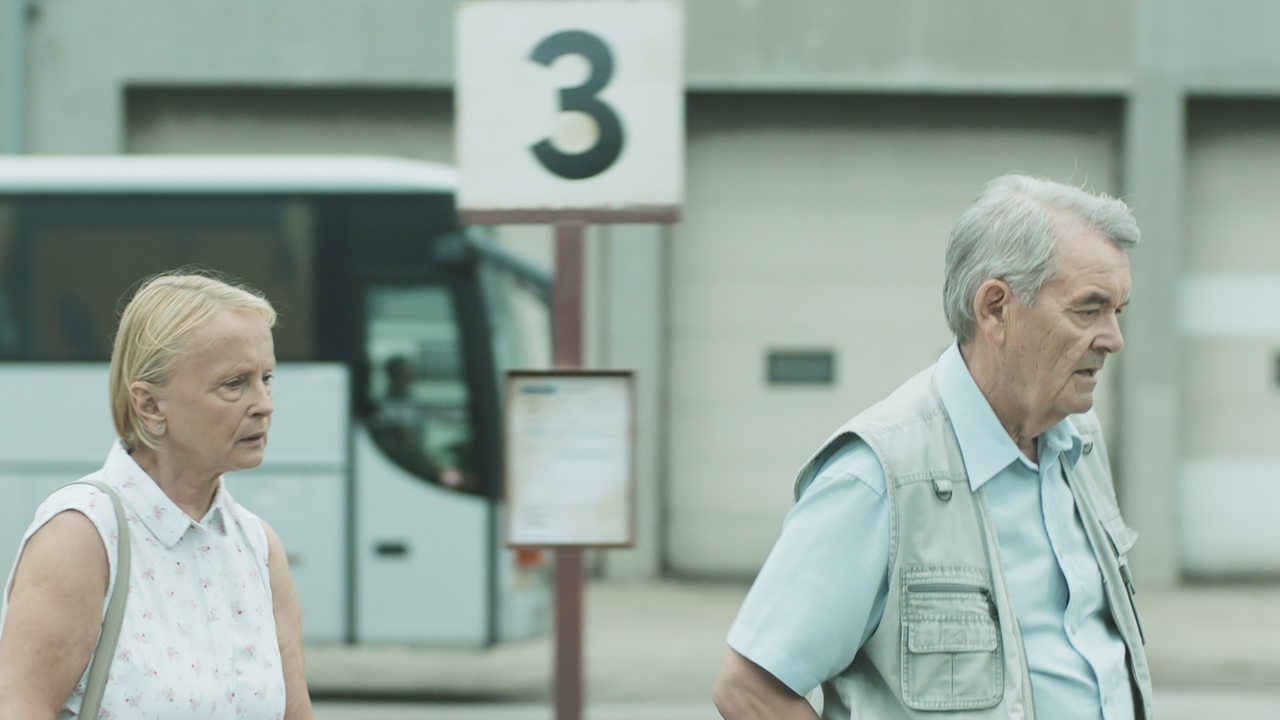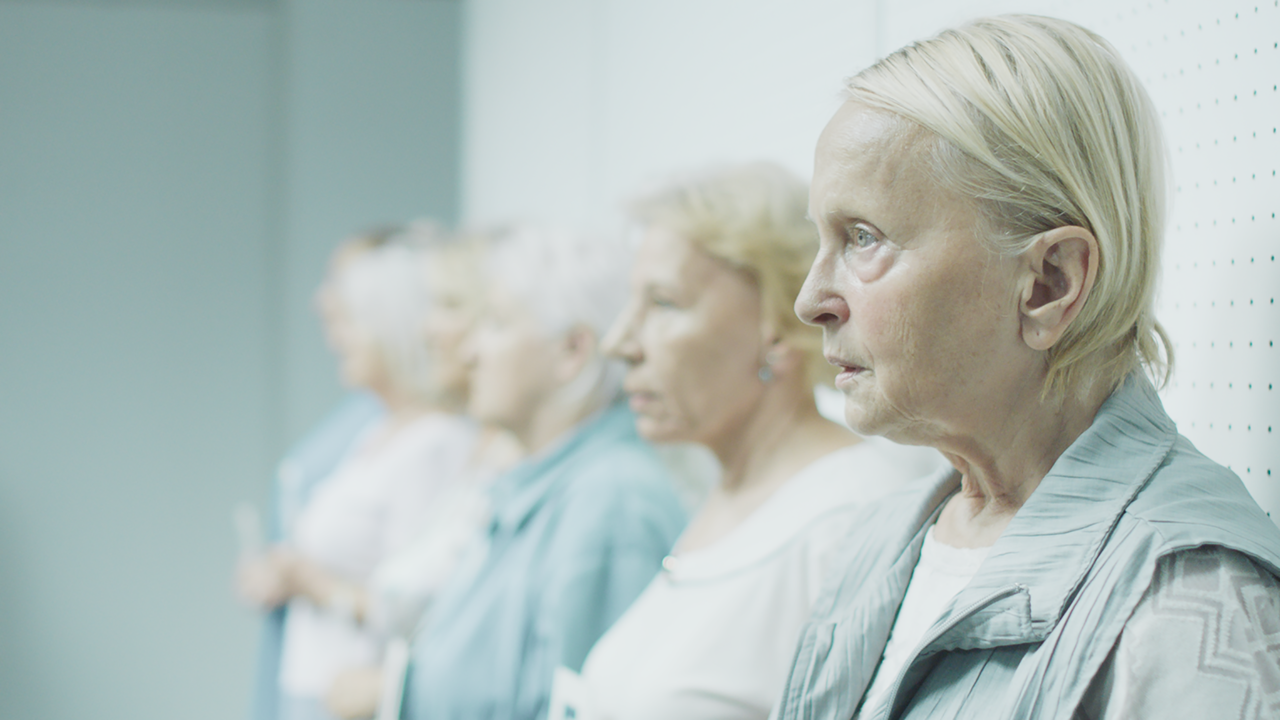Woman on the Roof: A Portrait of Depression
A review of Woman on the Roof at SIFF
Written by TeenTix Newsroom Writer Mickey Fontaine and edited by Teen Editorial Staff Member Audrey Gray

Anna Jadowska’s 2022 film Woman on the Roof is a movie with a very enticing premise: an elderly woman decides to rob a bank. It’s a simple idea that holds considerable potential for a story. Woman on the Roof proves you don’t need a big plot to tell an effective story. It uses its resources conservatively to weave a deeply impactful narrative teeming with commentary on challenging topics, such as depression, domestic norms, life, and the Polish mental health care system. With its various accolades, stunning washed-out color scheme, and intriguing story, I went into the film with high hopes. Woman on the Roof transcended them in almost every way.
Mira (Dorota Pomykała) is a 60-year-old midwife leading a mundane life. She struggles with deep, existential sorrow, finding little happiness in her relatively stable life and feeling alienated from her family and society. The world shows her the bare minimum of care, keeping her alive but not allowing her to truly live. This is seen on both a personal scale, in her home, and in the systems of her society. She is desperate for connection but is shown only indifference. She feels alienated in her home life and burdened by housework. Out of desperation, she robs a bank with a kitchen knife but runs away. The consequences begin to spiral, and she must reconsider how she lives her life as she grows distant from her family and society.
One of the most vital themes in Woman on the Roof is its nuanced depiction of depression. It is a pervasive trope in movies and TV for depression to manifest as a dramatic, aching sadness that appears in straightforward, easy-to-understand ways. While this portrayal may be convenient and digestible for the viewer, it’s not representative of reality. In the real world, depression doesn’t always manifest itself in clear ways. Woman on the Roof understands this and doesn’t use Mira’s depression as an emotional MacGuffin. Instead, it depicts it in a deeply personal and subtle way, opting to show instead of tell.

The decision to focus on Miras' personal complexity makes Woman on the Roof a deeply character-driven film. Jadowska uses her assets sparingly and never exercises excessive artistic control over the world. The film never tells you how to feel, nor does it guide you to an easy conclusion. She leaves the viewer breathing room and allows them to develop their own interpretation of the film’s events.
This decision adds a profoundly human layer to the characters—they are complicated, flawed people who make mistakes and don’t conform to the audience’s expectations. The film is set into motion by an impulsive action and is driven by Miras’ indecision. Those around ask her why she robbed the bank and why she feels so lost. The film never answers these questions because Mira herself doesn’t know why she did it or what she wants. Her motivations are clouded in sorrow. The film betrays one’s expectations and crafts this sense of uncertainty that allows the audience to relate to the characters; one experiences Miras' struggles instead of just witnessing them.
Jadowska uses lighting, silence, and dissociative cinematography to paint Mira’s deeply relatable experience. She depicts her familial duties as senseless and cold, showing her silently boiling water and cooking, obstructed in gaunt shadows, and constantly doing others' laundry. But one of the most nuanced ways that Jadowska depicts Mira is through her attempts to find support.
Mira communicates her need for help by tirelessly working for those around her, hoping for her desperate kindness to be reciprocated. She is seen constantly doing chores, going into loan debt to get things for others, and helping her sister get an abortion in another country. Despite her constant work, she doesn’t receive the appreciation or affection that she wants from her family. Even her professional work as a midwife is presented somewhat negatively. When she first delivers a child, the mother is disgusted by it and begs for it to be taken away. This functions both as commentary on abortion laws in Poland, a recurring theme in the film, and as a metaphor for how those Mira helps reject her and the effort she puts toward them. This is a great example of the director’s subtle approach to Miras' character. Jadowska never uses her characters’ desperation cheaply; more so than through their words, her characters are made human by their actions and their silence.

Lead Photo Credit: Film still from Woman on the Roof (2022) directed by Anna Jadowska
The TeenTix Newsroom is a group of teen writers led by the Teen Editorial Staff. For each review, Newsroom writers work individually with a teen editor to polish their writing for publication. The Teen Editorial Staff is made up of 5 teens who curate the review portion of the TeenTix blog. More information about the Teen Editorial Staff can be found HERE.
The TeenTix Press Corps promotes critical thinking, communication, and information literacy through criticism and journalism practice for teens. For more information about the Press Corps program see HERE.

